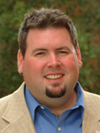CHIMERAS, CYBORGS, AND THE MORAL LIMITS OF SCIENCE
 Jason Scott Robert, Ph.D., Franca Oreffice Dean’s Distinguished Professor in the Life Sciences, Arizona State University |
Friday January 29, 2009
12:30-1:30 p.m.
Crawford Hall - Room 9
Inamori Center
Case Western Reserve University
Dear Colleagues,
Recent experiments in stem cell research and neurobioengineering promise treatments for a number of debilitating conditions. But this research is simultaneously exciting and forbidding. Dr. Robert will explore the science underlying recent developments, and focus on how scientists do, and how they should, attempt to justify their research. He will also explore the activities of citizens and ethicists in the face of controversial research. His talk should provoke discussion about the nature of personal, public, and social responsibility in twenty-first century civil society.
Dr. Jason Scott Robert is the Franca Oreffice Dean's Distinguished Professor in the Life Sciences, and the Lincoln Associate Professor of Ethics in Biotechnology and Medicine at Arizona State University. He directs the Bioethics, Policy, and Law Program in the Center for Biology and Society. In addition, he serves as Director of the Medicine and Society theme at The University of Arizona College of Medicine – Phoenix in partnership with Arizona State University. Professor Robert is extensively published in bioethics and the philosophy of biology, and his research currently focuses on how scientists try to justify controversial research.
As usual, we will gather in Room 9 of the Inamori International Center
for Ethics and Excellence, on the lower level of Crawford Hall, for
free cookies, beverages, and brown bag lunch.
Best regards,
Joe White
About Our Guest
Dr. Jason Scott Robert is the Franca Oreffice Dean's Distinguished Professor in the Life Sciences, and the Lincoln Associate Professor of Ethics in Biotechnology and Medicine, in SOLS. He conducts research and teaching at the intersection of bioethics and the philosophy of science. He has published extensively on ethical, conceptual, and methodological issues in developmental biology and evolution, and his current work focuses primarily on translational research in neuroscience. He is funded by the National Science Foundation and the James S. McDonnell Foundation to explore how neuroscientists do (and how they should) attempt to justify their research with non-human animals in the pursuit of findings relevant to humans. He is also interested in population and public health ethics, and in the social determinants of health.
Dr. Robert directs the Bioethics, Policy, and Law Program (BPL) in the Center for Biology and Society at ASU, administering the Biology MS and PhD concentrations in BPL, as well as the Biomedical and Health Ethics track of the new MA in Applied Ethics and the Professions. Dr. Robert is also Director of the Medicine and Society theme at The University of Arizona College of Medicine – Phoenix in partnership with Arizona State University, responsible for teaching and mentoring in the domains of bioethics and medical humanities, and he serves as Director of Education for the Scholarly Project at the medical school.
Dr Robert is Associate Editor for public health ethics of the Canadian Journal of Public Health, a co-editor for Philosophy of Biology of the Stanford Encyclopaedia of Philosophy, and a member of the editorial board of Biological Theory. He has served as program co-chair for the American Society for Bioethics + Humanities, and is active on several committees for the International Society for the History, Philosophy, and Social Studies of Biology
Friday Lunch Upcoming Topics and Speakers:
February 5: The Challenges of Increasing Faculty Diversity. With Marilyn Sanders Mobley, Vice President for Inclusion, Diversity and Equal Opportunity and Professor of English, CWRU.
February 12: Long-Term Care in the United States and the Netherlands. With M. C. Terry Hokenstad, Ralph S. and Dorothy P. Schmitt Professor, Mandel School of Applied Social Sciences.
February 19: An Actuary’s View of Health Care Reform Estimates. With John Bertko, former Vice President and Chief Actuary, Humana Inc.
February 26: Is Deindustrialization Bad for America? With Susan Helper, AT&T Professor and Chair, Department of Economics; David Clingingsmith, Assistant Professor of Economics; and Joe White.
March 5: Ohio’s State Budget: Now What? With Zach Schiller, Research Director, Policy Matters Ohio.
March 12: Spring Break, No Discussion
March 19: Science in the Courts. With Wendy Wagner, Joe A. Worsham Centennial Professor, University of Texas School of Law.
March 26: Observations in Beirut. With Bill Marling, Professor of English.
April 2: Abortion, Health Care Reform, and the Moral Dimensions of Political Compromise. With Susan Dwyer, Associate Professor of Philosophy, University of Maryland.
April 9: Business and Sustainability. With Roger Saillant, Ph.D. Executive Director, Fowler Center for Sustainable Values, Weatherhead School of Business.
April 16: : Does Environmental Responsibility Mean the Elderly Should Accept “Natural” Deaths? With Felicia Nimue Ackerman, Professor of Philosophy, Brown University.
April 23: What the Health Care Reform Law Will Do; or, Why Health Care Reform Failed; or, Health Care Reform: What Next? or, All of the Above. With Joe White, Luxenberg Family Professor of Public Policy
The Friday Lunch discussions are held on the lower (ground) level of
Crawford Hall. Visitors with mobility issues may find it easiest to
take advantage of special arrangements we have made. On most Fridays, a
few parking spaces in the V.I.P. lot in between Crawford Hall and Amasa
Stone Chapel are held for participants in the lunch discussion.
Visitors then can avoid walking up the hill to the first floor of
Crawford by entering the building on the ground level, through the
garage area under the building. The further door on the left in that
garage will be left unlocked during the period before the Friday lunch.
On occasion, parking will be unavailable because of other university
events.
For more information about these and other Center for Policy Studies
programs, please see http://policy.case.edu.

